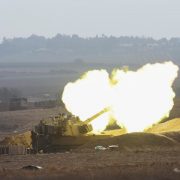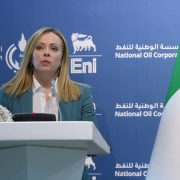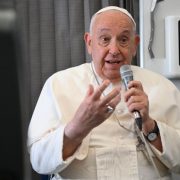
A year after the October 7 massacre, Israel is stronger than ever, and its enemies are weaker than ever. Yet, as the shadows of wars cloud half of the world, politics lags behind weapons—except for Putin.
A year after the brutal October 7 pogrom, the political situation surrounding Israel, the victim of the attack, is not bad. There are no pro-Palestine protests in Muslim countries; they are banned for fear of inciting unrest. Pro-Palestine demonstrations take place only in Western countries, where they are allowed but not welcomed. De facto, whether declared or not, there is broader global support for Israel, considered a barrier against extremist Islam in both the West and Muslim countries.
As a result, Palestine’s cause, represented by extremist Hamas, is effectively dead, along with its military structure, which the Israeli Army has declared obliterated. The future of Palestinians in Gaza and the West Bank remains uncertain, but the local moderate leadership now has much less room for negotiation than ever before.
The situation is equally dire for Iran, the main supporter of the Palestinians. Its proxy militia in Lebanon (Hezbollah) has been nearly wiped out, while the Houthi militia in Yemen is under fire. Iran itself seems to be teetering on the edge, anticipating a massive Israeli retaliatory strike following Tehran’s shooting of 180 missiles at Israel.
There is apparently no strategic thinking behind the continuous senseless push for war by Hamas and Iran. Global support is dwindling and will further diminish as the conflict continues. Militarily, Iran and its allies are hopeless against Israel. In the short term, military action bolsters the regime’s hardline rhetoric but undermines it in the medium term due to the direct and indirect devastating impact on the economy.
Then why is Iran still waging a war it is losing, a conflict that could break the regime in mere days or months? There are no straightforward answers to that. But the old Roman question might provide some insight: cui prodest? Who benefits from this?
Cui prodest
One clear beneficiary is Russia. A year ago, Moscow’s war in Ukraine was unraveling. Mercenary leader Yevgeny Prigozhin had marched on Moscow in June and then, after surrendering, was killed in a mysterious air incident at the end of August. By September, during the final Hamas preparations for the October 7 attack, Russian President Vladimir Putin’s public image, both domestically and internationally, was in decline.
A year later, the Russian political cause in Ukraine has gained new momentum, fueled by being intertwined with Hamas’s “liberation” message under a common anti-Western banner.
It might be a coincidence, and perhaps Putin, long a protector of Iran and its proxies in Syria, Iraq, and Yemen, didn’t mastermind it but just went along for the ride. And what a ride it has been. The flames of war have escalated, casting shadows over vast regions of the world, reaching into Asia, where Taiwan and North Korea—whatever China’s actual intentions—are increasingly viewed as hot flashpoints.
With so many planes flying around and so many ships circling Taiwan, people on the island and in the region believe that Beijing could order an attack without warning. This, in turn, unsettles the local society, which feels on the brink of war and becomes more divided. It exacerbates the island’s tension, initiating a vicious circle that may eventually prompt Beijing into unwise actions. China stumbling into a war would be a huge relief for Putin, opening up a whole new array of political options for him.
The backside
This line of thought might sound optimistic for Israel, but it conceals some unpleasant factors. Support for Israel in the region and the West is often not wholehearted. It exists mainly because the alternatives, Hamas and Iran, are far less palatable, while anti-Semitism remains a lurking threat in the West.
Israeli Prime Minister Bibi Netanyahu has announced the seed of a project for Gaza—its demilitarization and deradicalization. It’s a start, but much more is needed to win the hearts and minds of many people in the region who are influenced by decades of anti-Israeli rhetoric. Israel, the West, and Muslim elites long disregarded this rhetoric.
The Holy See has conversely long worked on this, often opposed by some Israeli organizations that did not recognize the positive aspects of deradicalization for the entire region. Now, more than ever, the Pope seems open to greater involvement, elevating the bishop of Tehran as a cardinal for the first time in history.
Military victory is significant, but it cannot succeed alone. Putin has barely achieved any martial success in Ukraine while possibly losing some 600,000 men. Still, he has sown the seeds of civil conflict in the West and cast the threatening shadow of war over half the world, proving the age-old point that politics is fundamental even in military confrontations. Putin has something to contribute to future negotiations about Ukraine—his own way of thinking about politics and war.
Not only the West, Israel but also Iran and China, Russia’s semi-allies, might want to heed this enduring principle in the following months. They could be very delicate, and any misstep could wreak havoc.
- In partnership with Appia Institute.






